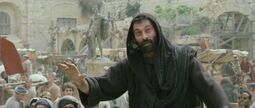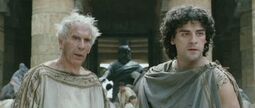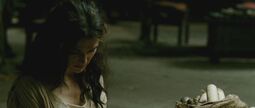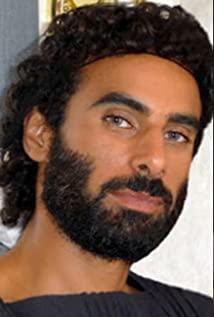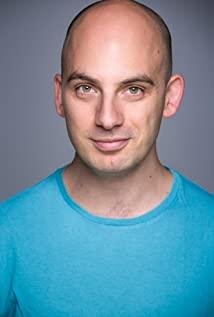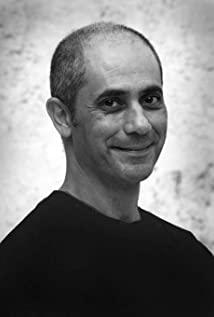The title of the film is agora, which refers to the (ancient Greek) square, which is also used many times in the film as a very important narrative space. Judging from the detached top-down perspective often seen in the film, the use of the plaza as the core space is very typical and in line with the space. The plaza is always filled with fanatical, extreme and large numbers of believers. The performances are all one-sided and group-like. The actions of one person will become the actions of everyone, and the slogan of one person will become the slogan of everyone. In this square, there is no space for self, and the crowd They are uniform, and the believers are of the same hands and feet. The scenographic space in extreme opposition to the square is Hypatia's "Academy". In the academy, the soft and dazzling sunlight always shone on Hypatia's body from behind her. All the arrangements and lighting treatments made the academy unsophisticated, holy and empty. Hypatia and her students and even the slave Daus can freely exchange all knowledge and ideas here, as Hypatia said: "We are brothers here, not rabble or slaves." As this space As an authority, she encourages others to develop and enrich their own self-space, to accommodate different social and religious identities, and it is a utopian ideal paradise. While Hypatia spreads knowledge and encourages tolerance in the academy, the plaza outside is divided. Even if you look at the years from the expulsion of polytheism to the expulsion of Judaism, the situation in the square is that two groups of different groups of people eat and attack each other until there is only one group of the same group of people in the square. This is not only the utility of space, but also historical. The way to go. The dramatic conflict of the film lies in the religious disputes at the macro level and the conflict between the individual and the collective at the micro level. Religious disputes are the background and the root of the narrative throughout the film's narrative years. In the first half of the story, the main dramatic conflict focuses on the rapid expansion of Daus' self-consciousness, which is derived from Hypatia's personal charm and charisma. The wisdom and enlightenment of his class resulted in him getting rid of his slave status and choosing a new identity for himself - a Christian, but in the process of choosing he was mixed between Hypatia and other Christians, and escaped with a book. Hypatia's unintentional swearing becomes the fire line that ignites self-esteem and the final pull ring of self-selection. Daus chose the Christian camp, which at the time seemed more self-worthy and secure. In the second half of the story, Oristis faces a similar predicament as Daus, threatened by violence from the Christian congregation and his own influence. With the help of the bright sloping ceiling light, the staggered positions and the magnificent music, Bishop Cyrene's speech and persuasion are very sacred and infectious in the film, and Oristis has completed his role change. Prompt Hypatia to usher in tragedy. The choice of Daus and Oristis turns them against the one group, who put empathy above individuality, embrace unanimity, and succumb to collective consciousness. In fact, what the whole film presents is the story of Christians in the square taking away two students with strong self-awareness in the college and destroying the teacher step by step. For Daus and Oristis, from their initial academic confrontation to their conversion to God together, it is a process of self-consciousness being consumed step by step, and the film also gives a clear hint of this process: Daus Dodging the question of the shape of the earth raised by the Mujahideen, Oristis did not understand Hypatia's pursuit of truth. They were both interested in the entire universe, and now they are both interested in a god. Xu Zhiyuan once said: "The less you have space for yourself, the more hypocritical and cruel people will be." In the film, the entire group of Christians is shown hypocritical and cruel, constantly intriguing in a shameless way. Daus finally ended Hypatia's life with his own hands. In the circumstances at the time, this was a helpless act and a good deed. As a Christian, Daus' rare act of kindness was done after he left the Christian community. , when facing Hypatia alone, he is no longer a Christian, he is more like a student at the beginning, his self-consciousness is reincarnated like a destiny, he is a rebel group but not against his original heart , this is his final and brightest highlight of the film. As for Hypatia, who has spent her life in the pursuit of truth, as Wang Xiaobo said: "Intellectuals are most afraid of living in an irrational age." Her fate has long been doomed. Philosophy is her way to heaven, and philosophy is her hanging. rope. . Daus finally ended Hypatia's life with his own hands. In the circumstances at the time, this was a helpless act and a good deed. As a Christian, Daus' rare act of kindness was done after he left the Christian community. , when facing Hypatia alone, he is no longer a Christian, he is more like a student at the beginning, his self-consciousness is reincarnated like a destiny, he is a rebel group but not against his original heart , this is his final and brightest highlight of the film. As for Hypatia, who has spent her life in the pursuit of truth, as Wang Xiaobo said: "Intellectuals are most afraid of living in an irrational age." Her fate has long been doomed. Philosophy is her way to heaven, and philosophy is her hanging. rope. . Daus finally ended Hypatia's life with his own hands. In the circumstances at the time, this was a helpless act and a good deed. As a Christian, Daus' rare act of kindness was done after he left the Christian community. , when facing Hypatia alone, he is no longer a Christian, he is more like a student at the beginning, his self-consciousness is reincarnated like a destiny, he is a rebel group but not against his original heart , this is his final and brightest highlight of the film. As for Hypatia, who has spent her life in the pursuit of truth, as Wang Xiaobo said: "Intellectuals are most afraid of living in an irrational age." Her fate has long been doomed. Philosophy is her way to heaven, and philosophy is her hanging. rope.
View more about Agora reviews



